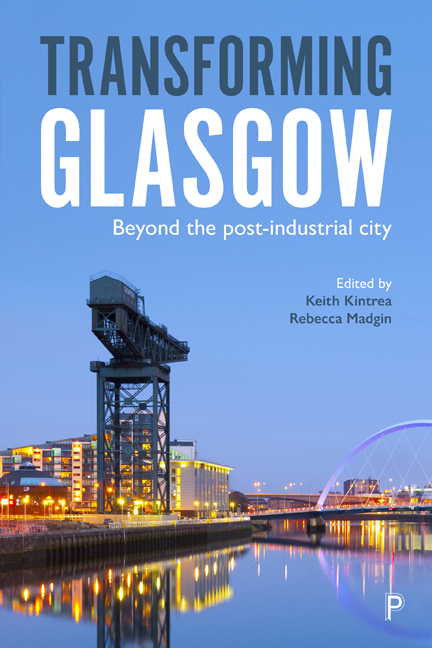Book contents
- Frontmatter
- Contents
- List of Maps, Tables, Figures and Boxes
- Notes on Contributors
- Acknowledgements
- Foreword
- Map
- Introduction: Transforming Post-Industrial Glasgow – Moving Beyond the Epic and the Toxic
- PART I
- PART II
- PART III
- Conclusion: Beyond the Post-Industrial – Narratives of Time and Place
- Index
PART I
Published online by Cambridge University Press: 25 March 2021
- Frontmatter
- Contents
- List of Maps, Tables, Figures and Boxes
- Notes on Contributors
- Acknowledgements
- Foreword
- Map
- Introduction: Transforming Post-Industrial Glasgow – Moving Beyond the Epic and the Toxic
- PART I
- PART II
- PART III
- Conclusion: Beyond the Post-Industrial – Narratives of Time and Place
- Index
Summary
The chapters that make up Part I are principally focused on economic themes, or rather we should say themes of political economy. A recurrent idea throughout the book – and in this Part – is that public policy and politics across many different domains have been and remain vital to transforming Glasgow, even in an era where every city is exposed to the exigencies of global capital flows.
Although Glasgow's deindustrialisation in the 20th century is attributable to the loss of the competitiveness of its narrowly founded economic base, this was occurring at a time when there was active public management of the Scottish space economy. Collins and Levitt in Chapter 1 show how successive rounds of Scottish economic and spatial development policy favoured locations other than Glasgow, and actively contributed to its economic collapse. This outcome was consistent with the contemporary notion that a chief task of planning was to sweep away the toxic 19th-century industrial city, with new town and small town locations favoured as growth centres instead. In the 1980s, with the emergence of a more positive approach to cities, public policy set out to work to stimulate new kinds of investment and to speed the growth of a service-based urban knowledge economy, as predicted by the theorists of post-industrialism. Chapter 2, by Patrick, Kennedy and MacLeod, explains how this worked in Glasgow. It shows that the transition to a post-industrial economy has, to a considerable extent, been successfully delivered, even if there still are doubts about the long-term security of Glasgow's economy, and the extent to which the city's economy brings benefits to all groups and to all parts of the city.
Chapters 3 and 4 consider some contemporary challenges of urban policy. Both wrestle with the idea that Glasgow's possibility to move on to a new phase of development with associated economic (and social) benefits ‘beyond the post-industrial city’ rests on the capacity for adaptation within contemporary structures and processes of government. In Chapter 3 David Waite examines the rise of cityregionalism, essentially the establishment of forms of urban governance that recognise that functional urban economic geography extends beyond tightly bounded cities into the economic areas beyond. He charts its uncertain rise in Glasgow and the difficulties of further developing regional governance within Scotland's distinctive political landscape.
- Type
- Chapter
- Information
- Transforming GlasgowBeyond the Post-Industrial City, pp. 19 - 20Publisher: Bristol University PressPrint publication year: 2019



